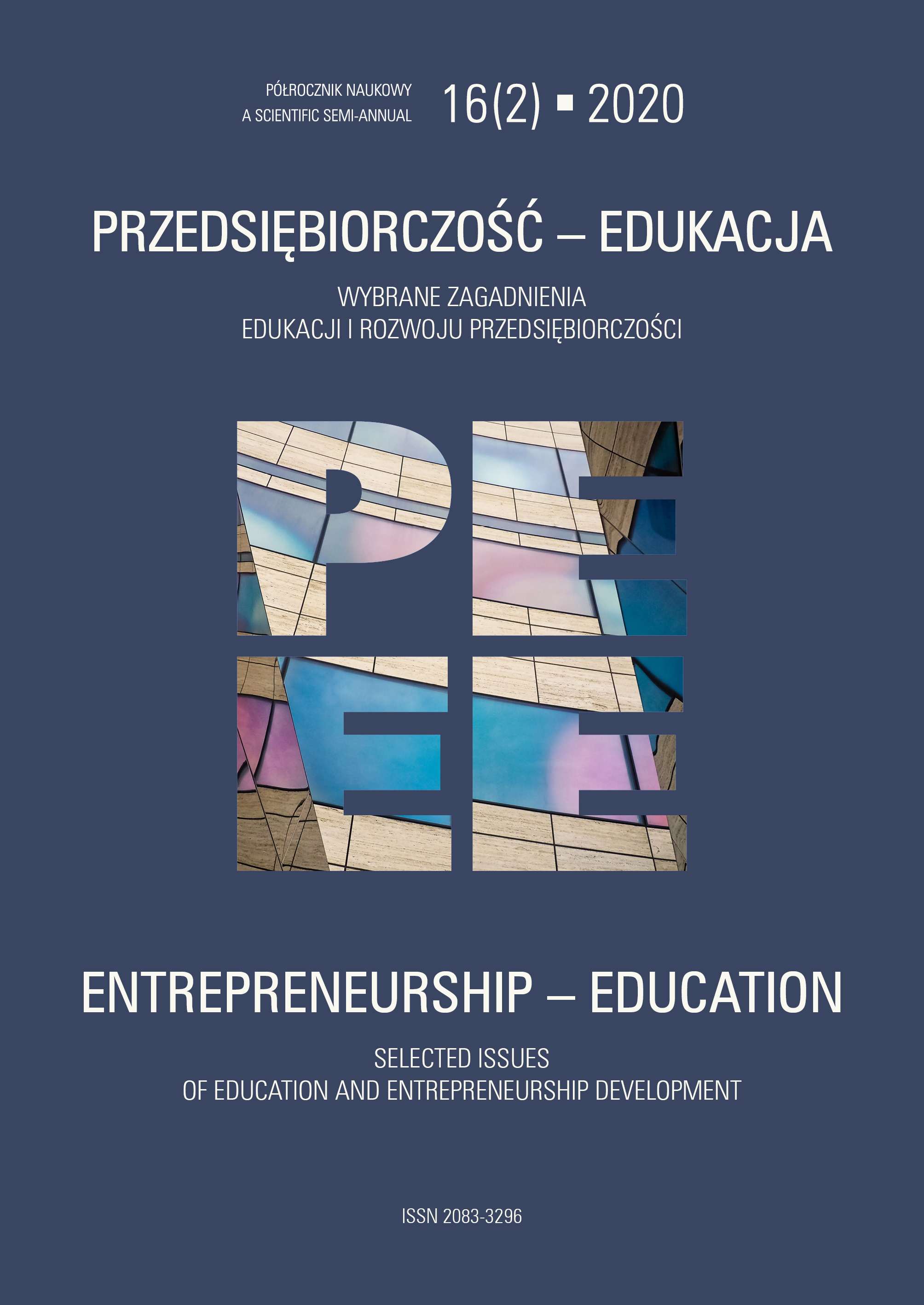The Role of Questions in Developing Entrepreneurship of Younger School-Age Students
DOI:
https://doi.org/10.24917/20833296.162.5Keywords:
early school education, entrepreneurship, teacher opinions, the role of questionsAbstract
The article deals with the subject of the role of questions in developing entrepreneurship in younger school-age students. The aim of the article was to show, according to Bloom’s taxonomy, the role that questions play in shaping the entrepreneurial attitude of children, obtain information on the kinds of questions used in practice by the surveyed early childhood education teachers and how they perceive entrepreneurship. The content of the article was enriched with the results of surveys using the survey technique. The obtained data indicate that the surveyed teachers mainly declare the use of questions from the lower levels of thinking organisation (knowledge, understanding, application), which to a lesser extent stimulate students to more complex mental operations than questions from the level of assessment, analysis and synthesis. Most of the respondents see entrepreneurship broadly and go beyond the economic perspective of the issue. The surveyed teachers are able to indicate a few strategies for developing entrepreneurship, but among them there are no strategies for formulating thought-provoking questions and in-depth reflection. The acquired knowledge may become a contribution to drawing the attention of current and future teachers to this important aspect of developing and stimulating entrepreneurship. The article also includes examples of strategies and good practices that use questions to develop an entrepreneurial mindset in students.
References
Adamek, I., Bałachowicz J. (red.). (2011). Kompetencje kreatywne nauczyciela wczesnej edukacji dziecka. Kraków: Impuls.
Axelsson, K., Hägglund, S., Sandberg, A. (2015). Entrepreneurial Learning in Education. Preschool as a Take-Off for the Entrepreneurial Self. Journal of Education and Training, 2(2), 40–58.
Brzezińska, A., Schmidt, J. (2008). Przedsiębiorczość jako warunek udanego startu w dorosłość. W: A. Andrzejczak (red.), Przedsiębiorczość w edukacji. Poznań: Wydawnictwo Akademii Ekonomicznej, 21–23.
Fisher, R. (1999). Uczymy, jak myśleć. Warszawa: Wydawnictwa Szkolne i Pedagogiczne.
Ir, E. (2016). Nauczyciel w kontekście zmian społecznych. Pedagogika Przedszkolna i Wczesnoszkolna, 1(7), 51–56.
Ir, E., Janiszewska, M. (2015). Hierarchia wartości nauczycieli przedszkoli miasta Krakowa. Pedagogika Przedszkolna i Wczesnoszkolna, 2(6), 73–80.
Klus-Stańska, D. (2000). Po co nam wiedza potoczna w szkole? W: K. Kruszewski (red.), Pedagogika w pokoju nauczycielskim. Warszawa: Wydawnictwa Szkolne i Pedagogiczne.
Kłos, Z. (2012). Innowacyjność i przedsiębiorczość innowacyjna. Poznań: Wydawnictwo Politechniki Poznańskiej.
Kondracka-Szala, M., Malinowska, J. (2016). Studiowanie – czas na rozwijanie postawy przedsiębiorczej nauczycieli dziecka młodszego? Analiza porównawcza programów kształcenia w zakresie przedsiębiorczości na polskim i fińskim uniwersytecie. E-mentor, 3(65), 4–14.
Łobocki, M. (1984). Metody badań pedagogicznych. Warszawa: PWN.
Nęcka, E. (2001). Psychologia twórczości. Gdańsk: GWP.
Oelszlaeger-Kosturek, B. (2017). Przedsiębiorczość – istota i sposoby kształtowania w procesie edukacji wczesnoszkolnej. W: A. Murzyn, U. Szuścik (red.), Przedsiębiorczość jako wartość w edukacji. Katowice: Wydawnictwo Uniwersytetu Śląskiego, 154–166.
Paul, R., Binker, A.J.A., Charbonneau, M. (1996). Crictical Thinking. Handbook. Sonoma: State University.
Pilch, T. (1995). Zasady badań pedagogicznych. Warszawa: Wydawnictwo ŻAK.
Runco, M.A. (2003). Idea evaluatio, divergent thinking and creativity. W: M.A. Runco (red.), Critical creative processes. Creskill: Hampton Press, Inc.
Sternberg, R.J., Spear-Swerling, L. (2003). Jak nauczyć małe dzieci myślenia. Gdańsk: GWP.
Sufa, B., Grzywniak, C., Vaskevic-Buś, J. (2019). Kompetencje społeczne uczniów w młodszym wieku szkolnym. Prace Monograficzne – Uniwersytet Pedagogiczny im. Komisji Edukacji Narodowej, 924.
Sufa, B., Janas M. (2017). O rozwijaniu inicjatywności i przedsiębiorczości uczniów w młodszym wieku szkolnym. W: T. Łączek (red.), Wychowanie do sukcesu życiowego – wybór czy konieczność. Kielce: Wydawnictwo Uniwersytetu Jana Kochanowskiego.
Turska, D. (2006). Skuteczność ucznia. Lublin: Wydawnictwo UMCS.
Witkowski, L. (2007). Między pedagogiką, filozofią i kulturą. Studia, eseje, szkice, t. 3. Warszawa: IBE.
Zoller E. (2009). A dlaczego? Jak odpowiadać na trudne pytania dzieci. Gdańsk: GWP.
Downloads
Published
How to Cite
Issue
Section
License
Articles are published under the terms of the Creative Commons License (CC BY-ND 4.0; Attribution– NoDerivs).

